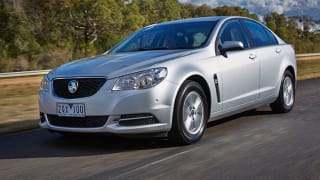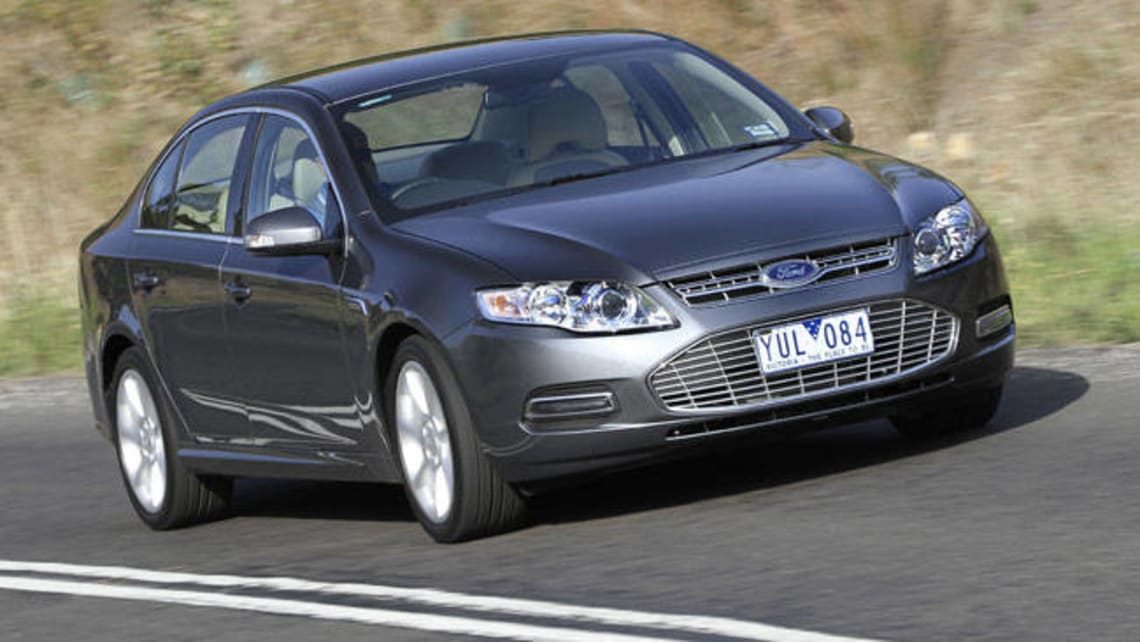
Holden Commodore Evoke 2013 Review
This could well be the last Commodore the way the industry is going. Big one-size-fits-all cars...
Browse over 9,000 car reviews

If the Australian large car industry is looking for a swan song as it struggles to remain viable, then Ford has a hot contender.
Its four-cylinder EcoBoost Falcon is proof that a relatively small engine is no handicap in a large car. The EcoBoost engine is available on the XT, G6 and G6E at the same price as the 4.0-litre six-cylinder engine, starting at $37,235.
Smooth, quiet and responsive, the 2.0-litre turbocharged, direct injection EcoBoost engine pumps out an impressive 179kW and 353Nm. While this is 16kW and 42Nm less than the Falcon's venerable 4.0-litre six-cylinder engine, it has more torque than the rival V6 Commodore and Aurion, so there is no doubt about its performance.

Matched to the standard six-speed automatic transmission, fuel use is 8.1litres/100km and on tests averaged 8.6litres/100km, which makes it the most frugal large petrol-powered car made in Australia. And, while it needs 95 RON fuel to achieve this 18 per cent gain over the six-cylinder version, Ford says it will run on 91.
The same engine is used by Volvo in the S60 and V60, and no one questions their performance. And the Falcon produces 2kW more power and 30Nm more torque, yet is similar in weight.
The EcoBoost gets a five star ANCAP safety rating. Side curtain airbags and rear parking sensors are now standard on the XT.
Turn the key and there is a different cranking sound from the auto cranking system (flick and release the key) than the six. The engine sounds more refined and the steering feels lighter. Off the line, the EcoBoost is punchy and flexible. After a slight pause as the turbo spins up, the thrust is strong, smooth and linear all the way to the red line.
Driven normally, it barely raises a sweat and does most of its work well below 3000rpm -- yet when needed it will spin eagerly and smoothly to 6500rpm. Rolling response is instant and willing, and it cruises at a relaxed 1900rpm at 100km/h and easily holds the taller gear ratios in hilly terrain, pulling happily from as low as 1500rpm.
It is also quieter than the six, thanks to additional noise insulation. Towing capacity drops from 2300kg to 1600kg, so there is still a role for the six. Ride, handling and steering have been tuned to match the lighter engine and the ride height is lower by 13mm on the entry-level XT. The six-speed automatic transmission is smooth, intuitive and linear in its response.
There is a little more low-speed patter from the 16-inch low rolling resistance tyres, as fitted to the XT (on test), but it is minimal and overall the ride is compliant and composed on all surfaces. Handling is confident and sure-footed, with good body control, and the steering is light and direct. Official figures show the sprint to 100km/h comes up in 7.5 seconds, just a fraction of a second behind the 75kg heavier six-cylinder version.
Unfortunately, as impressive as the EcoBoost engine is, it has not be enough to slow the slide in large cars this year, the Falcon falling 29 per cent and the rival Commodore down 26 per cent. So as the slide continues, the question remains -- has Ford saved its local best until last?
| Vehicle | Specs | Price* | |
|---|---|---|---|
| (base) | 4.0L, ULP, 6 SP MAN | $8,250 – 11,550 | 2012 Ford Falcon 2012 (base) Pricing and Specs |
| R6 | 4.0L, ULP, 6 SP AUTO | $8,030 – 11,330 | 2012 Ford Falcon 2012 R6 Pricing and Specs |
| (LPI) | 4.0L, LPG, 6 SP AUTO | $12,760 – 16,940 | 2012 Ford Falcon 2012 (LPI) Pricing and Specs |
| R6 (lpi) | 4.0L, LPG, 6 SP AUTO | $8,690 – 12,210 | 2012 Ford Falcon 2012 R6 (lpi) Pricing and Specs |
$5,990
Lowest price, based on 117 car listings in the last 6 months